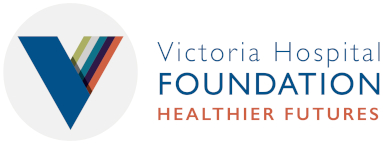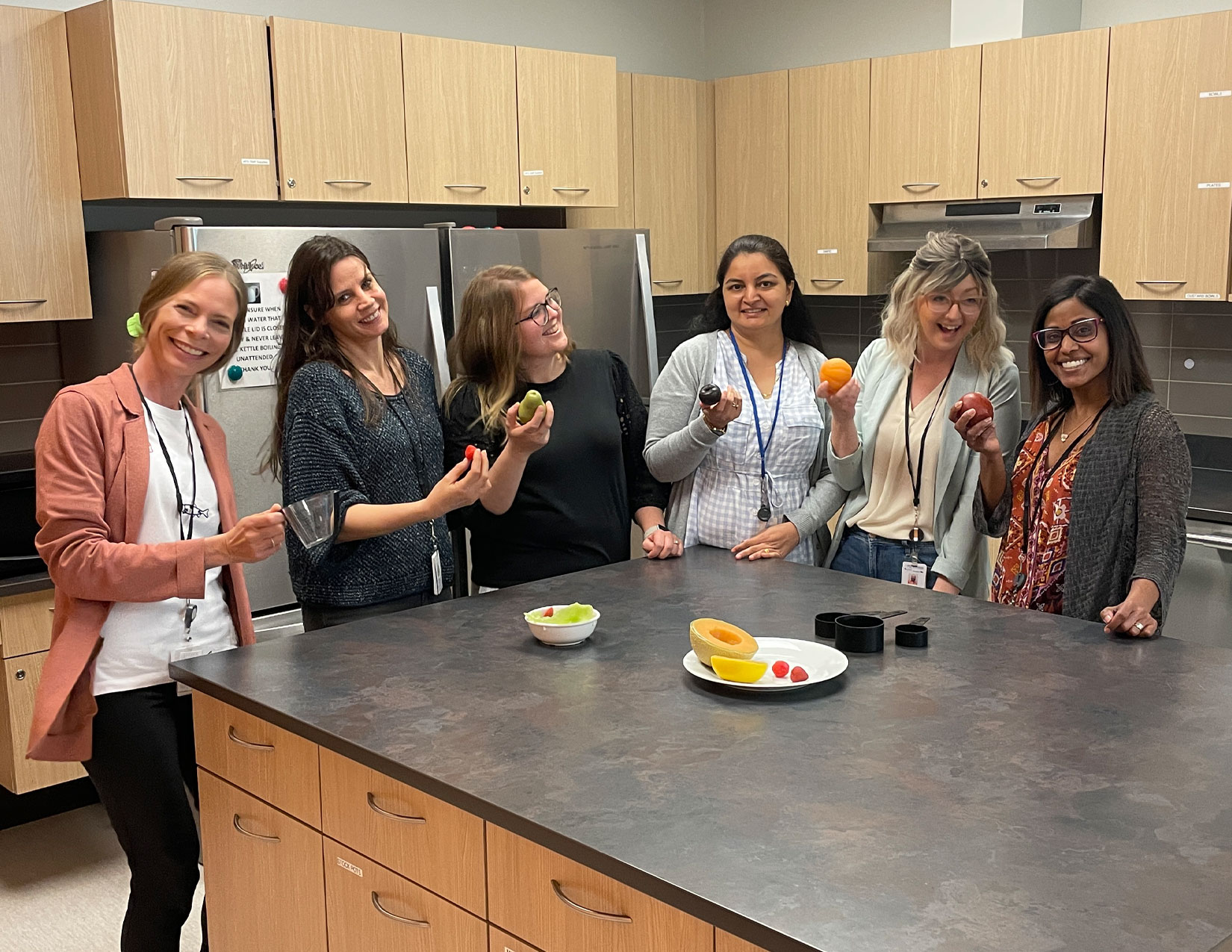Pictured above: a group of health support workers in the Access Fort Garry Kitchen where the cooking classes were held.
Thanks to the generosity of our donors, we invested in a series of cooking classes at ACCESS Fort Garry (AFG) through our Healthy Community Grant Program. The My Health Team at AFG was granted $1,500 to host cooking classes for mental health clients using the AFG community kitchen.
Victoria Hospital Foundation created the Healthy Community Grant to support initiatives that advance healthcare at Victoria Hospital and in our community. A healthy, well-balanced diet is proven to feed our mental health and improve our well-being. And with the generosity of our donors, this grant allows the Foundation to support, enhance, and transform mental health care in our community.
We were fortunate to speak with Sana Jamil, one of the mental health support workers with a My Health Team who helped to run the recent cooking classes. My Health Teams are teams of care providers in our communities that work with clients to provide them with the healthcare they need, when they need it. Over the course of four weeks, two mental health support workers planned and organized the classes for two of their clients. Many aspects were considered when planning the classes, such as the mental health and independence of the client, budget, nutrition, transportation, and Covid-19 restrictions.
“It’s easy to learn and it’s something that they (the client) want to learn. Compared to discussing something that they’re not really interested in. But cooking is something where there is a motivation to learn and they’re able to enjoy it.” – Sana Jamil, Mental Health Support Worker
The Cooking Class Outline
The main objective of the cooking class was to teach cooking skills to individuals that are involved in the South Winnipeg community mental health program, as well as provide them with more opportunities for socialization. Due to space restrictions in the AFG kitchen caused by COVID-19, only four people could be in the kitchen at one time—two support workers and two clients. This small group was beneficial for the two clients that they were working with, since it allowed for more individualized attention. The group met once a week at AFG to prepare the planned meals, and talk about different aspects of nutrition and cooking. At each class, the support workers explained the Canada Food Guide to clients, as well as the importance of having a healthy diet, while still keeping the cost of food in mind.
Together, the participants learned how to prepare simple, nutritious meals such as overnight oats, omelettes, vegetable soup, and lentil burritos. The Healthy Community Grant made these classes possible by supplying the funds to purchase all of the ingredients needed to make the meals, as well as any bus tickets needed for the clients to get to and from AFG. At the end of each class, the clients were able to enjoy the meals that they prepared, and take home any leftovers and extra ingredients to prepare the meals on their own.
Impacts of the Cooking Class
When given the opportunity to participate in events such as the cooking class, “clients are able to meet other people who are going through the same mental health struggles and obstacles” says Jamil. Clients can become very easily isolated and don’t usually get to participate in these types of activities, which is why it was so crucial to be able to have an interactive, in-person cooking class.
Research shows how beneficial socialization can be for mental health, as well as the cognitive benefits that come from social interactions. For the clients, being able to socialize and behave how they would in society contributes to making a positive impact on their mental wellness journey. Learning new skills in the cooking class was a mentally stimulating activity for the clients, and also allowed them to be more physically active, compared to if they were having the meals prepared for them. From walking around the kitchen, to chopping and stirring ingredients, the participants were able to partake in tasks they don’t typically do on their own.
When speaking about the impact the cooking classes had on the clients, Jamil reflects, “one of the biggest things we noticed was our clients surprise and interest to learn about new foods and how they can substitute ingredients to suite their own tastes.” The clients were excited to participate, learn new things, and then enjoy the meal at the end of the class; it was a rewarding experience for both the clients and support workers.
Preparing for Future Cooking Classes
“We are hoping to run classes again this summer,” Jamil says, “The more we run these kinds of group activities, the more we learn about how to adapt to what works best for our clients.”
Having the Healthy Community Grant support the cooking class program enabled the My Health Team to envision how the classes would work with a larger group, but also see the benefit of having smaller groups that allowed for more individualized attention. After the program concluded, the team was approached by many other support workers to ask about the classes and who indicated interest for other clients to participate in the future. When the classes run again, the team would look into advertising the classes sooner to reach more clients and make a larger impact in the community.
The generous grant from donors of Victoria Hospital Foundation made it possible to run the cooking classes for mental health clients at AFG. This grant helped to make a positive impact in the participants’ lives by providing them with the opportunity to socialize and connect with others, learn new skills and participate in an activity that they looked forward to and enjoyed.
“I just want to give a little picture that the client is not here to show, but they were very happy they were able to participate in a group like that and which wouldn't have been possible if there wasn’t a grant. Thank you for giving that opportunity—it's very important to the clients. It was really helpful.” – Sana Jamil




